CRAFTY CHAT: harbourfront craft symposium recap
Thanks to Lucie we have a lucid report of what went down at the Harbourfront craft symposium I mentioned a few posts ago. Read on if you have an interest in fine craft history & related issues...
Lucky for us, TCA was invited down to Harbourfront’s Crafting New Traditions: Canadian Innovators and Influences symposium at the weekend, and we thought it only fair that we shared with our info-savvy readers exactly what went on.
One of the most thought-provoking elements of the entire event was the key-note speech delivered by Mark Kingwell on Friday night. A philosopher at U of T, Mark espoused some pretty complex cultural and critical theory in his presentation – After a Fashion: Traditional and the Individual Talent. It initially had us cowering confused in our theatre seats, but placed in a wider context, he had some really interesting things to say about fashion and the economy of desire. Eschewing the notion that fashion is only for the tragically hip, he revealed how it was actually helpful, necessary even, when tracing our history. It also got us thinking about dissatisfaction with our lives, craft, job etc, and how we are all forever desiring something new - a state of unreachable satisfaction. Apparently, this is actually okay and helpful though (especially if you turn your desire towards something productive like craft making) which, we think you’ll agree, is nice to be reminded of, once in a while.
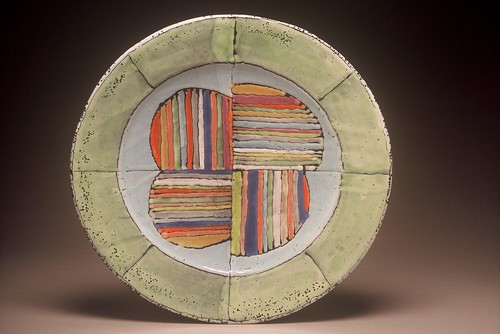
Walter Ostrom - Byzantine Flower
Other presentations were largely historical descriptions of contemporary and historic Canadian craftspeople, which can be found in the Museum of Civilization-published accompanying book of the same name as the symposium. Despite the strong need to trace these largely unrecognized histories, we felt a little overwhelmed by the sheer amount of fact being thrown at us. But there were some highlights, and we were especially fascinated in the thorny issue of gender in relation to craft history (which, by the way, was echoed in the symposium roster of speakers which was at least 80 per cent women!). Writer, craftsperson and thinker Sandra Flood provided a helpful historical context, which demonstrated the battle women have fought to have their crafts exhibited, bought and recognised as professional over the last two centuries, as well as the way craft has been used as a political, social tool since the suffrage movement. Guerrilla knitters take note!

Sandra Noble Goss-Door
Meanwhile, Director of Saint Mary’s University Art Gallery and gay rights activist Robin Metcalfe also shed some light on gender and craft, examining the work of Glynis Humphreys through her astonishing piece Gorge, a wedding dress installation in dress size 66! which explored the notion of female body beauty, social positioning. Rachel Godley’s look at the work of famous Canadian craft couples, such as New Brunswick’s pioneer potters the Deichmanns, got us thinking about the kind of problems couples face in working together on a joint venture despite a typically romanticized portrayal by mainstream media.
Professor and Design Exchange Curator Michael Prokopow’s provocative wrap-up speech clearly ruffled a few feathers, but his antipathy toward craft and questioning of where it fits within the larger economic machine posed a conundrum. How do we engage with craft and how do we describe it in a contemporary “post-modern” context? (its meaning, as opposed to its appearance). The answer according to the panel seemed to be that craft simple needs more people writing, curating and enquiring. Time to get enrolled on that OCAD course perhaps readers?
Lucky for us, TCA was invited down to Harbourfront’s Crafting New Traditions: Canadian Innovators and Influences symposium at the weekend, and we thought it only fair that we shared with our info-savvy readers exactly what went on.
One of the most thought-provoking elements of the entire event was the key-note speech delivered by Mark Kingwell on Friday night. A philosopher at U of T, Mark espoused some pretty complex cultural and critical theory in his presentation – After a Fashion: Traditional and the Individual Talent. It initially had us cowering confused in our theatre seats, but placed in a wider context, he had some really interesting things to say about fashion and the economy of desire. Eschewing the notion that fashion is only for the tragically hip, he revealed how it was actually helpful, necessary even, when tracing our history. It also got us thinking about dissatisfaction with our lives, craft, job etc, and how we are all forever desiring something new - a state of unreachable satisfaction. Apparently, this is actually okay and helpful though (especially if you turn your desire towards something productive like craft making) which, we think you’ll agree, is nice to be reminded of, once in a while.

Walter Ostrom - Byzantine Flower
Other presentations were largely historical descriptions of contemporary and historic Canadian craftspeople, which can be found in the Museum of Civilization-published accompanying book of the same name as the symposium. Despite the strong need to trace these largely unrecognized histories, we felt a little overwhelmed by the sheer amount of fact being thrown at us. But there were some highlights, and we were especially fascinated in the thorny issue of gender in relation to craft history (which, by the way, was echoed in the symposium roster of speakers which was at least 80 per cent women!). Writer, craftsperson and thinker Sandra Flood provided a helpful historical context, which demonstrated the battle women have fought to have their crafts exhibited, bought and recognised as professional over the last two centuries, as well as the way craft has been used as a political, social tool since the suffrage movement. Guerrilla knitters take note!

Sandra Noble Goss-Door
Meanwhile, Director of Saint Mary’s University Art Gallery and gay rights activist Robin Metcalfe also shed some light on gender and craft, examining the work of Glynis Humphreys through her astonishing piece Gorge, a wedding dress installation in dress size 66! which explored the notion of female body beauty, social positioning. Rachel Godley’s look at the work of famous Canadian craft couples, such as New Brunswick’s pioneer potters the Deichmanns, got us thinking about the kind of problems couples face in working together on a joint venture despite a typically romanticized portrayal by mainstream media.
Professor and Design Exchange Curator Michael Prokopow’s provocative wrap-up speech clearly ruffled a few feathers, but his antipathy toward craft and questioning of where it fits within the larger economic machine posed a conundrum. How do we engage with craft and how do we describe it in a contemporary “post-modern” context? (its meaning, as opposed to its appearance). The answer according to the panel seemed to be that craft simple needs more people writing, curating and enquiring. Time to get enrolled on that OCAD course perhaps readers?







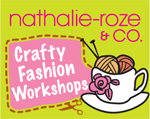


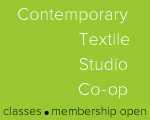


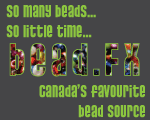



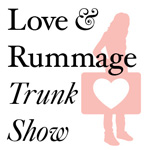




0 Comments:
Post a Comment
<< Home